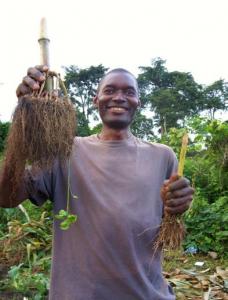Biochar Fund, Kumba, Cameroon
Septemer, 2009

Since December 2008, more than 1500 subsistence farmers in Cameroon's South-West Region (SWR) have been participating in the largest-ever field trial testing the effects of biochar on crop productivity. The first results of this ongoing experiment, based on maize planted in a large series of plots, are now available. The data can be described as 'remarkable', in that they demonstrate how biochar consistently helps to boost crop productivity in tropical soils, sometimes in a spectacular manner.
The preliminary results suggest that biochar may offer a solution to hunger and food insecurity amongst the world's poorest, as well as to soil depletion and tropical deforestation.
Data Page with Current Results
Project Photo Pages with Participant and Plant Photos
See the Biochar Fund Report Page for an the Full Report, and continuing updates

